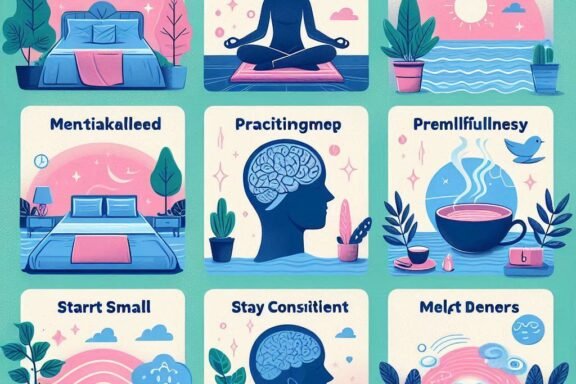The Art of Self-Care: Creating a Lifestyle That Nurtures Your Mind, Body, and Soul
In today’s fast-paced world, the concept of self-care has taken on greater importance than ever before. With the constant demands of work, family, and social obligations, it’s easy to forget to prioritize your own health and well-being. But self-care is not a luxury—it’s a necessity.
Self-care is about more than just pampering yourself with a bubble bath or an occasional spa day (though those things certainly help!). At its core, self-care is about creating a lifestyle that supports your physical, mental, and emotional health every day. It’s about making conscious decisions that contribute to your well-being in all aspects of life, from the way you eat to how you manage stress, from the boundaries you set to the people you surround yourself with.
In this blog, we’ll explore how to incorporate self-care practices into your daily life and how making small, intentional changes to your lifestyle can lead to profound improvements in your overall health and happiness.
What is Self-Care?
Self-care is a broad and personal concept. It can encompass a range of activities, from physical health habits (like exercise and nutrition) to mental wellness practices (such as mindfulness and stress management). At its heart, self-care is about nourishing yourself—taking the time to recharge, heal, and nurture your mind, body, and spirit.
Self-care is often misunderstood as indulgence or selfishness, but in reality, it’s a foundational element of living a balanced and fulfilling life. Just as you would care for a loved one by giving them the time, space, and resources they need to thrive, self-care means offering yourself the same compassion and attention.
1. Building a Self-Care Routine: The Importance of Consistency
The key to successful self-care is consistency. It’s not enough to engage in self-care activities sporadically when you’re feeling overwhelmed. Creating a daily self-care routine can ensure that you prioritize your well-being, even when life gets busy. Think of it as setting aside time each day to recharge and check in with yourself.
Steps to create your own self-care routine:
- Morning rituals: Start your day with practices that set a positive tone. This could include meditation, journaling, drinking a glass of water, or stretching to wake up your body. A few minutes of mindfulness or deep breathing can help you center yourself before diving into the day’s tasks.
- Exercise and movement: Include some form of physical activity in your routine. Whether it’s a morning walk, yoga, or a workout at the gym, moving your body can boost your mood, improve your energy levels, and reduce stress. Find something you enjoy so that exercise becomes a natural part of your lifestyle.
- Nutrition: Fuel your body with wholesome, nutritious food. Eating a balanced diet of whole foods—fruits, vegetables, lean proteins, and healthy fats—nourishes both your body and mind. Consider planning your meals in advance to ensure you’re consistently eating foods that support your health.
- Evening rituals: End your day with activities that help you unwind. This could include reading, taking a warm bath, or practicing a gratitude meditation before bed. Allow yourself to slow down and disconnect from the demands of the day.
By integrating self-care into your daily routine, you ensure that your physical and mental health is consistently nurtured.
2. Physical Self-Care: Taking Care of Your Body
Taking care of your body is one of the most fundamental aspects of self-care. Physical health isn’t just about looking good—it’s about feeling good and having the energy to live life to the fullest. Regular physical activity, nourishing foods, and adequate sleep are cornerstones of a healthy lifestyle.
Key components of physical self-care:
- Exercise: Physical activity has a profound impact on both your body and mind. It helps reduce stress, improve mood, boost energy, and maintain a healthy weight. Whether it’s a daily walk, a yoga class, or strength training, find activities that make you feel good and aim to move your body regularly.
- Nutrition: What you eat directly affects your energy, mood, and overall health. Focus on a whole foods diet that includes plenty of fruits, vegetables, lean proteins, and healthy fats. Avoid overly processed foods, sugary snacks, and excessive caffeine, as these can contribute to anxiety, fatigue, and mood swings.
- Sleep: Never underestimate the power of a good night’s sleep. Quality rest is essential for physical recovery, mental clarity, and emotional well-being. Aim for 7-9 hours of sleep each night and establish a calming bedtime routine to ensure you’re getting restorative rest.
Physical self-care also means listening to your body and giving it what it needs. This might involve taking breaks throughout the day, getting up from your desk regularly, or scheduling regular health checkups. Your body is your foundation, and treating it with care is one of the most powerful ways to invest in yourself.
3. Mental and Emotional Self-Care: Nourishing Your Mind
While physical health is vital, mental and emotional well-being are just as important. Mental self-care involves caring for your thoughts, emotions, and overall mindset. In a world filled with constant information, stress, and distractions, it’s crucial to make time for activities that help you process your emotions, reduce anxiety, and build resilience.
Practices to nurture your mental and emotional health:
- Mindfulness and Meditation: These practices help you stay present and calm your mind. Meditation, even for just a few minutes a day, can reduce stress, improve focus, and increase emotional resilience. Try incorporating mindfulness into everyday activities, such as eating, walking, or even cleaning, to enhance your awareness and reduce anxiety.
- Journaling: Writing down your thoughts, feelings, and experiences can be a powerful tool for emotional release and self-reflection. Journaling helps you process complex emotions, track personal growth, and gain clarity on your goals and aspirations.
- Boundaries: Part of emotional self-care is learning to set healthy boundaries with others. Saying “no” when you need to, avoiding toxic relationships, and creating space for yourself are all important aspects of protecting your mental well-being. Setting boundaries empowers you to protect your time, energy, and emotional health.
- Gratitude: Practicing gratitude has been shown to improve mood, reduce stress, and enhance overall life satisfaction. Consider keeping a gratitude journal where you write down things you’re thankful for each day, or take a moment each evening to reflect on positive experiences.
4. Social Self-Care: Building Positive Connections
Humans are social beings, and the quality of our relationships can significantly impact our well-being. Social self-care is about surrounding yourself with supportive people and nurturing meaningful connections. This can help you feel loved, supported, and connected—three essential ingredients for emotional health.
Tips for social self-care:
- Cultivate positive relationships: Invest time and energy into relationships that make you feel good. Surround yourself with people who uplift, support, and inspire you. Cut ties with toxic individuals who drain your energy or contribute to stress.
- Seek support when needed: It’s okay to ask for help. Whether it’s a therapist, a close friend, or a support group, talking to others about your challenges can help you feel less isolated and more understood.
- Quality time: Spend quality time with loved ones, whether it’s a coffee date with a friend, a family dinner, or a weekend getaway. Meaningful connections are a vital part of emotional well-being.
5. The Importance of Fun and Play: Reigniting Your Joy
Amid all the hustle and bustle of daily life, it’s easy to forget the importance of play and enjoyment. Fun activities and hobbies help you recharge, reconnect with your creative side, and reduce stress. Play is an essential part of self-care because it allows you to engage in activities that bring you joy and satisfaction, without any pressure or obligations.
Ways to incorporate fun into your lifestyle:
- Hobbies and interests: Whether it’s painting, dancing, cooking, or gardening, make time for hobbies that ignite your passion and creativity. These activities allow you to engage fully in the present moment, helping you disconnect from stress.
- Travel and exploration: Take time to explore new places and experiences. Traveling—even if it’s just a day trip to a nearby town—can help break up routine and offer a fresh perspective.
- Playful activities: Engaging in playful activities, like games, sports, or even having a spontaneous dance party, can elevate your mood and bring joy into your life.
Conclusion: Creating a Lifestyle of Self-Care
Incorporating self-care into your lifestyle isn’t just about indulging yourself when you have free time—it’s about creating a holistic routine that supports your mind, body, and spirit. By prioritizing your well-being each day, you build a foundation for a healthier, happier life. Self-care helps you manage stress, improve your emotional resilience, boost your physical health, and connect more deeply with yourself and others.
Remember, self-care isn’t a one-time activity—it’s a continuous practice that evolves with your needs and circumstances. By creating a lifestyle centered around self-care, you empower yourself to face life’s challenges with strength, clarity, and confidence.
Take the time to nurture yourself. You deserve it.







No Comments